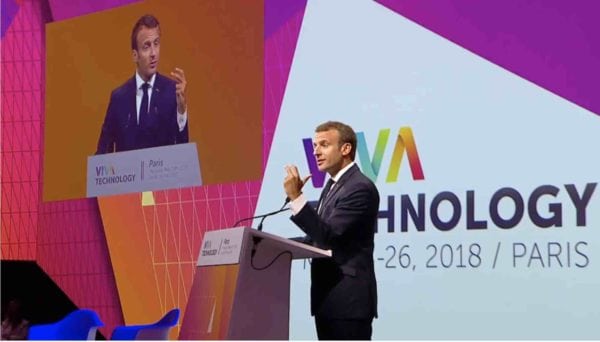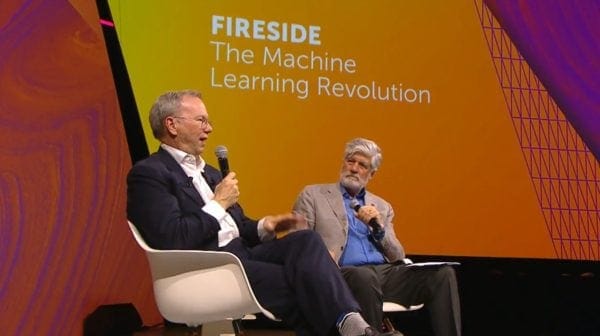President Macron at Viva Tech, the “French CES”
The question to ask about Viva Tech, the French Tech show taking place in Paris, May 24th to 26th, is not “Who goes there?” but rather “Who doesn’t?”
In its third edition, Viva Tech, launched in 2016 by Maurice Levy, the Chairman of global advertising group Publicis and the French business media Les Echos, was bigger than ever with more than 100,000 visitors, 2,000 exhibitors including 1,800 startups, and 400 speakers.
Most impressive was the list of global CEOs and Chairmen in attendance as speakers or guests. Tech A-listers included Ginni Rometty of IBM, Satya Nadella of Microsoft, Eric Schmidt of Alphabet, Mark Zuckerberg of Facebook, Chuck Robbins of Cisco, Bill McDermott of SAP, Dara Khosrowshahi of Uber, Stewart Butterfield of Slack, Frédéric Mazzella of BlaBlaCar, Joe Lubin of Consensys… But the Who’s Who of global non-primarily tech companies was also represented with CEOs and Chairmen of companies such as Axa, BNP, LVMH, Booking.
However, the one repeat guest speaker whom French attendees were probably most keen to listen to was France’s President Emmanuel Macron. This year, as in the previous years, President Macron did not disappoint as he claimed for France a leading role in global technology, and in particular in artificial intelligence which was one of the major themes of the show.
The Tech for Good Summit
To make sure that Tech A-listers would attend the show, President Macron had convened 61 Chairmen and CEOs of global Tech companies, including the ones mentioned above, to a “Tech for Good Summit” on the 23rd of June, the day before the show.
The Summit included a workshop during which participants were asked to brainstorm solutions to make technology serve the common good, to alleviate the threats posed by technology in terms of issues such as job destruction and privacy protection, and to increase the positive impact of technology in areas such as diversity and equality.
At the end of the day, Ginni Rometty of IBM, who seemed quite sold to the program, announced the creation of 1,800 jobs in France. Dara Khosrowshahi of Uber announced an improvement of Uber drivers’ health and retirement plans ‒ an issue which had been a huge point of contention with the authorities in France. Mark Zuckerberg made no announcement, but he did take up the Tech for Good theme in his speech the day after.
Global Technology Needs Policies and Regulation To be Sustainable
On stage at Viva Tech the day after, on the 24th, President Macron reasserted his ambitious plans for France as “the place to be, the new gateway to Europe” and explained how France has changed in terms of corporate and labor regulations, among other things by reducing corporate taxes.
[clickToTweet tweet=”President Macron reasserted his ambitious plans for France as “the place to be, the new gateway to Europe” and explained how France has changed in terms of corporate and labor regulations, among other things by reducing corporate taxes” quote=”President Macron reasserted his ambitious plans for France as “the place to be, the new gateway to Europe” and explained how France has changed in terms of corporate and labor regulations, among other things by reducing corporate taxes”]
 But then President Macron quickly focused on his Tech for Good theme. He explained that, in his view, Tech for Good is the rational path to “sustainable technology.”
But then President Macron quickly focused on his Tech for Good theme. He explained that, in his view, Tech for Good is the rational path to “sustainable technology.”
In President Macron’s view, global technology is currently dominated by two currently equally efficient, but also equally unsustainable models, the deregulated US model and the over-centralized Chinese one.
According to hem, the US deregulated model tends to divide people into the technology-haves and have-nots. It created a world where tech leaders “have not always been exemplary,” where unfair competition based on tax evasion creates distrust; where the “winner-takes-all” model amplifies inequalities. In Emmanuel Macron’s words:
“I am a big Tech optimist and this country believes in innovation. But it’s not sufficient. Making money, creating jobs… making shareholders happy is not enough. The tech ecosystem cannot behave as if it lived in a vacuum. It is not sustainable… “
Tech companies live in a “real place.” They must commit to the community and that also means paying taxes:
“It is impossible not to have a common tax rule… It not fair that [some large tech corporations] pay no taxes… That’s why I will fight to the end [for the Fair Taxation of the Digital Economy at European level]. I believe this is fair. It is a precondition for a sustainable relationship.”
Government as A Pillar of Democracy
 Far from apologizing for the regulation-oriented European approach to technology markets, Macron claimed that policies and regulations are an inherent part of a sustainable technology progress.
Far from apologizing for the regulation-oriented European approach to technology markets, Macron claimed that policies and regulations are an inherent part of a sustainable technology progress.
“I do believe in artificial intelligence, but if we want to succeed in artificial intelligence, we have to work together and build a smart regulation. […]
GDPR [EU General Data Protection Regulation that came into force on May 25, 2018] is a very important step forward. […] We are building a European sovereignty for data and we have to do the same for the cloud. […] We are putting our startups in a position to succeed in a clear framework. That is the precondition for our citizens to believe, to put trust in this new environment and to preserve this pillar of democracy which is trust in Government.
I’ll be very blunt with you. The US model [of technology] was driven by private players. […] It is not sustainable. It is not sustainable for a government to say, ‘In terms of privacy, I’m not in charge, I’m sorry.’ […] Governance is our job, our responsibility. For me, the US model is no more sustainable because there is not political accountability.”
[clickToTweet tweet=”Far from apologizing for the regulation-oriented European approach to technology markets, Macron claimed that policies and regulations are an inherent part of a sustainable technology progress” quote=”Far from apologizing for the regulation-oriented European approach to technology markets, Macron claimed that policies and regulations are an inherent part of a sustainable technology progress”]
Better not Dismiss Macron
 No doubt, President Macron’s strong statements did raise quite many eyebrows. Many French observers were quite skeptical about his and France’s ability to drive global change in the face of such powerful companies as the US GAFA’s and the Chinese giants.
No doubt, President Macron’s strong statements did raise quite many eyebrows. Many French observers were quite skeptical about his and France’s ability to drive global change in the face of such powerful companies as the US GAFA’s and the Chinese giants.
But judging from what Macron accomplished in France where he conquered the presidency in startup mode within less than 18 months, it would be foolish to dismiss his projects.
Here are some of the initiatives he mentioned.
- Digital Africa: A platform for French and African digital innovators to reach international visibility and gain access to new partners, clients, investors, and talents in order to contribute to the digital transformation of Africa.
- Artificial Intelligence for Humanity: France’s strategy for becoming a leader in artificial intelligence while designing an ethical and regulatory framework for it.
- Tech for Good Summit: Marcon proposed to continue the current effort, monitor progress and repeat the Tech for Good Summit every year as a global think tank for Tech leaders to work on technology and the common good.
Link to President Macron’s speech
 Therese Torris, PhD, is a Senior Contributing Editor to Crowdfund Insider. She is an entrepreneur and consultant in eFinance and eCommerce based in Paris. She has covered crowdfunding and P2P lending since the early days when Zopa was created in the United Kingdom. She was a director of research and consulting at Gartner Group Europe, Senior VP at Forrester Research and Content VP at Twenga. She publishes a French personal finance blog, Le Blog Finance Pratique.
Therese Torris, PhD, is a Senior Contributing Editor to Crowdfund Insider. She is an entrepreneur and consultant in eFinance and eCommerce based in Paris. She has covered crowdfunding and P2P lending since the early days when Zopa was created in the United Kingdom. She was a director of research and consulting at Gartner Group Europe, Senior VP at Forrester Research and Content VP at Twenga. She publishes a French personal finance blog, Le Blog Finance Pratique.





